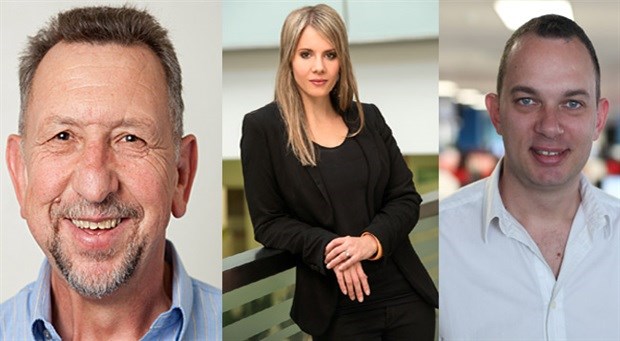





The future of work is the title of many articles and research reports within the human resources and recruitment industry, currently. One could say predicting the future of work is a trend all in itself.
Like many service industries that we have seen disrupted in recent times, forcing new models through - like Uber has done to public transport; Airbnb to the hotel industry; and big tech companies like Google and Amazon have done to traditional corporate culture, so the entrenched organisational hierarchical power model is being further disrupted by millennials and ongoing societal change.
Not since the open plan office revolution and the ditching of formal work wear, has management been this uncomfortable. Millennials work differently, shop differently, and are motivated more by corporate brand values and flexible working hours, than money. They don’t believe in the main, that their lives should be disrupted by their work. And, here’s the real shocker: they want to be happy at work!

Digital technology is the most fundamental change that has impacted on the human resources and recruitment industry, says Yolanda Gibbon, founder of Cardilogix.
“It saw businesses locally and globally having to change their HR strategies and employment practices. Generation Z and the millennials are turning to that which they know best – social platforms to search and interact with prospective employers. They believe in building and cultivating relationships but want to know more about their future employer, so a personal interaction and relationship on these social platforms makes this possible.”
It is this new workforce of digital natives and social savvy beings that is contributing to the need for organisations to transform. This, and the fact that current organisational structure is over 100 years old and has not kept pace with changes in culture and society.
Holacracy is the biggest trend in the disruption of organisational culture and it heralds an exciting new era for the traditional organisation in terms of structure and workplace practice.
In the latest episode of the Tomorrow Trends podcast aired last week, futurists, Graeme Codrington and Raymond de Villiers, of TomorrowTodayGlobal are in conversation on the future of work and what it means for organisations.
TomorrowTodayGlobal consistently challenges corporates to rethink their organisations since we are living in disruptive times, which require different strategies. Holacracy is a new approach and model for organisational design.
TomorrowTodayGlobal CEO Graeme Codrington says holacracy is a new way of thinking in organisational structure, it certainly is the current buzz, and a new trend that they have highlighted as something worth looking at and which they are experimenting with in their own team.
De Villiers says that current business structures are designed for a world of work that no longer exists: a top down hierarchy; a career path that works you up the ladder; people at the top with more authority than people on the bottom, regardless of skill or experience; and inherited legacy systems.
“It has overt structure, but the covert reality that sits under the surface and the misalignment between those two things, creates the mess.”
Current hierarchical organisational structure originated in the early 1900s, aligned with societal structure at the time. “Now we have this inherited organisational work structure that no longer aligns with the way people live, think,” says De Villiers.
De Villiers explains that traditional hierarchical organisational structure is a pyramid with fewer individuals with more power, the higher up you go. Holacracy is about multiple circles in an organisation. Those circles are oriented around tasks - “what we need to get done”. It isn’t leaderless, but the role and space of leadership is strategic and about the visionary structure for the business.
Tasks are put out and the business self-organises around the tasks. Whoever has the skills and abilities gets involved. Team members can play different roles in different tasks – maybe as project leader for one task, an expert for another. Leadership doesn’t necessarily dictate who that individual will be. It is self-organising, recounts De Villiers.
“Holacracy is the extension of a trend. We are now getting labels put on something that people can talk about. We also have leading organisations doing it, like Zappos, a subsidiary of Amazon, which made the move into holacracy over a period of 18 months.”
Codrington emphasises that this is a critical new trend because it does indicate a change in the way things have always been done in organisations. De Villiers urges organisations to revisit the inherited rules in place in business and evaluate them to see if they need to be disinherited as legacy rules that no longer apply, in order to make some of the cultural shifts needed.
The rise of employer branding – how companies position themselves as attractive in the marketplace so they attract top talent – is a key trend that feeds into this. Whether companies are progressive and will accommodate new organisational thinking and the demands of the millennial workforce, is something that the talent is looking for.
Companies and recruiters are developing a better understanding of employer branding and its importance, says Marc Privett, general manager of Careers24.com. “How a company is perceived by employers and potential candidates can either help it to attract and sign top talent or discourage candidates from considering job opportunities or offers from that particular organisation.”
Just as social media allows employers to vet potential employees, so too does it allow top talent to find out everything they want on potential employers. It is this greater transparency that means that organisations need to be authentic about what they stand for.
“Employers can no longer make blanket statements about their values and the way they work - employers need to walk their talk or be exposed on social media,” says Allan Pike, CEO of Key Recruitment Group.
This includes how employers treat their employees – whether they have to work excessive overtime, whether work/life balance is taken into account, and so on. It also plays an important role in retaining top-calibre talent once organisations have attracted the top achievers, says Tanya Eksteen, director of resourcing for Sage International.
“Offering a lucrative salary is not enough anymore. A work-life balance, flexibility, career growth, professional development and other benefits such as maternity and paternity leave, all play an integral part in the candidate’s decision-making process,” she emphasises.
Since social media platforms are now the most important factor in employer branding as well as search, Gibbon says HR teams should actively keep watch to see what the competition is doing, posting and offering in terms of remuneration and benefits and how they are hiring talent, to be even more innovative.
“In recent research it was found that top performing companies have a socially engaged workforce. Not only does your workforce act as your brand evangelists, it makes your company attractive to prospective employees.”
While Eksteen points out that social media and other digital platforms have become a standard way of communicating with employees and attracting top talent, Pike cautions employers that the personal touch remains important.
“Although the big employment portals have radically increased the availability of candidate prospects, potential employees still want to feel that they are being considered both in terms of ‘who’ they are and the skills profile they represent, hence the need for personal engagement with prospects remains an important part of the recruitment process,” Pike explains.
